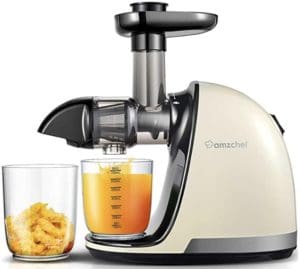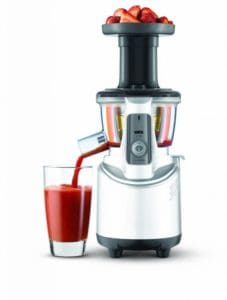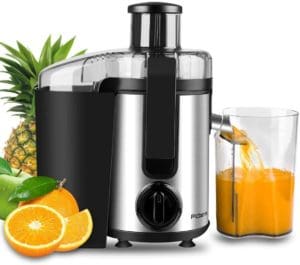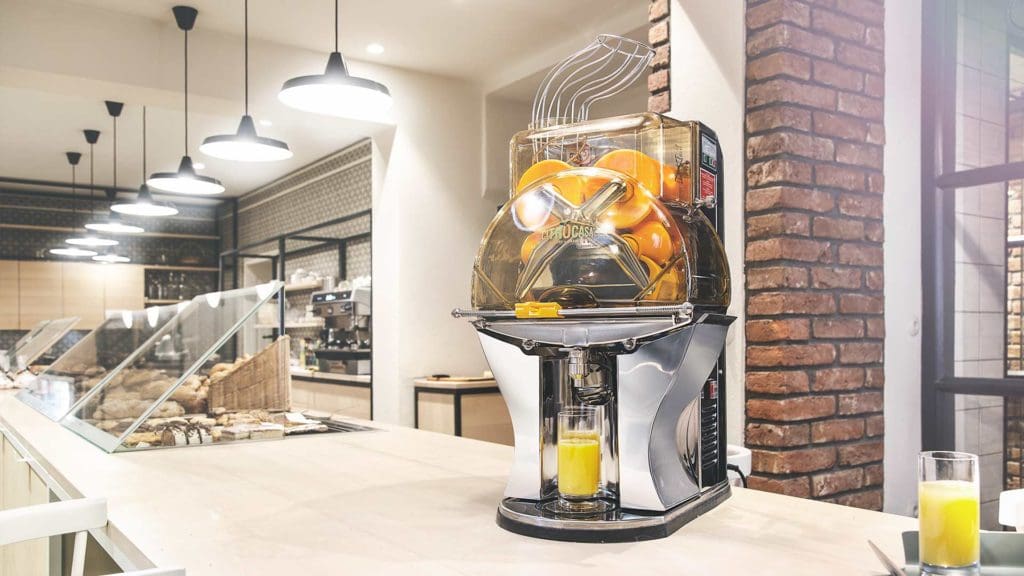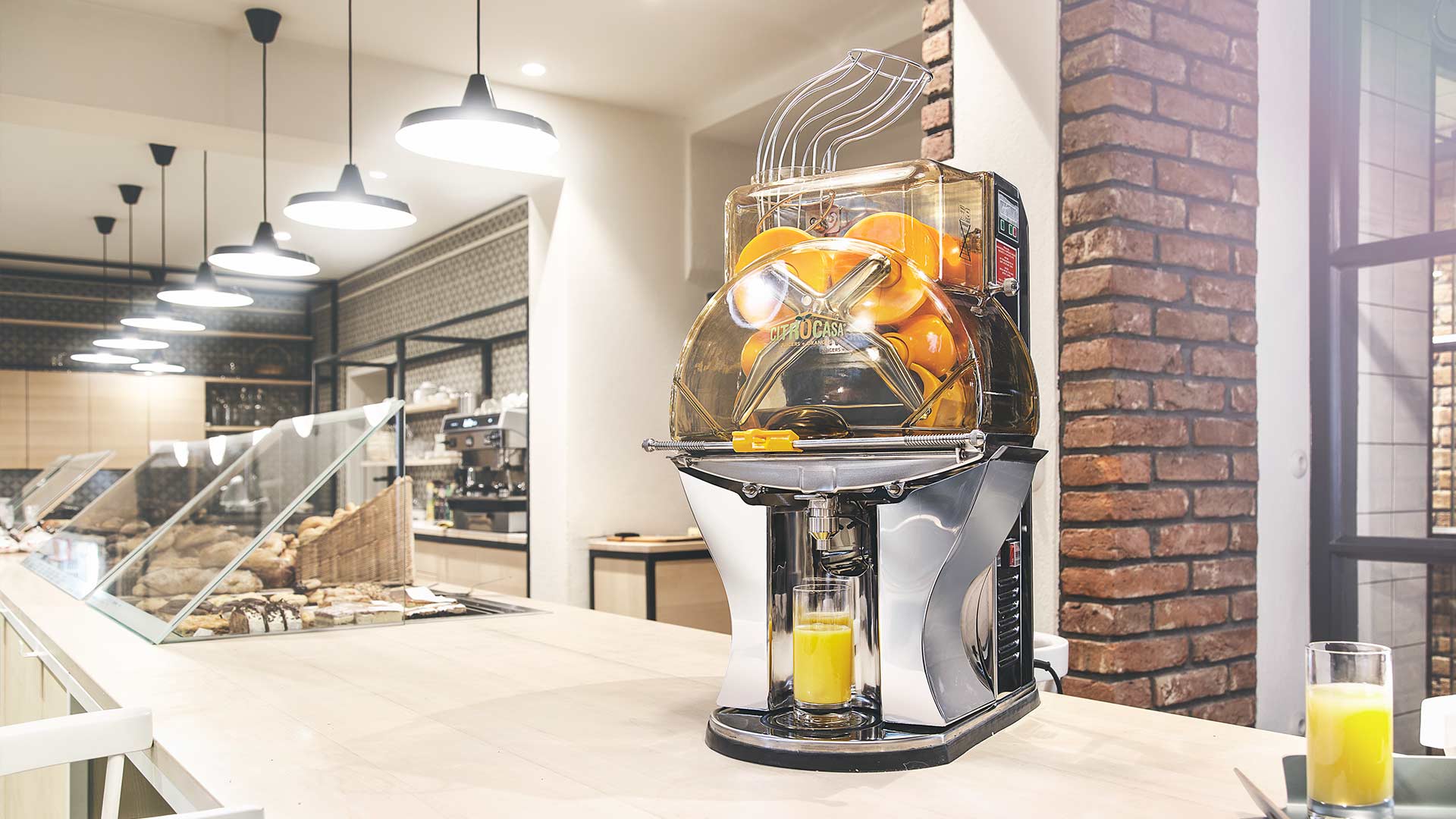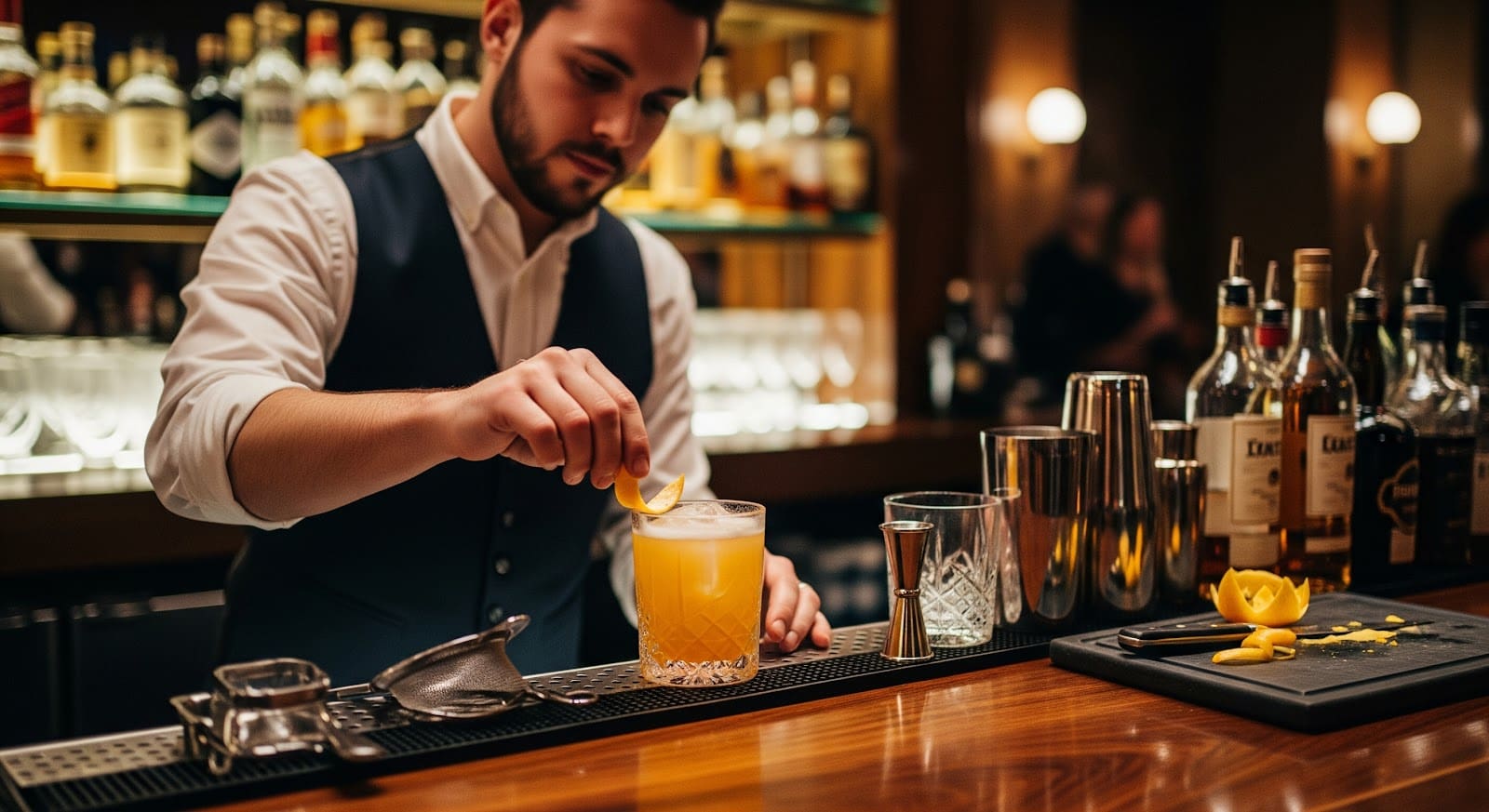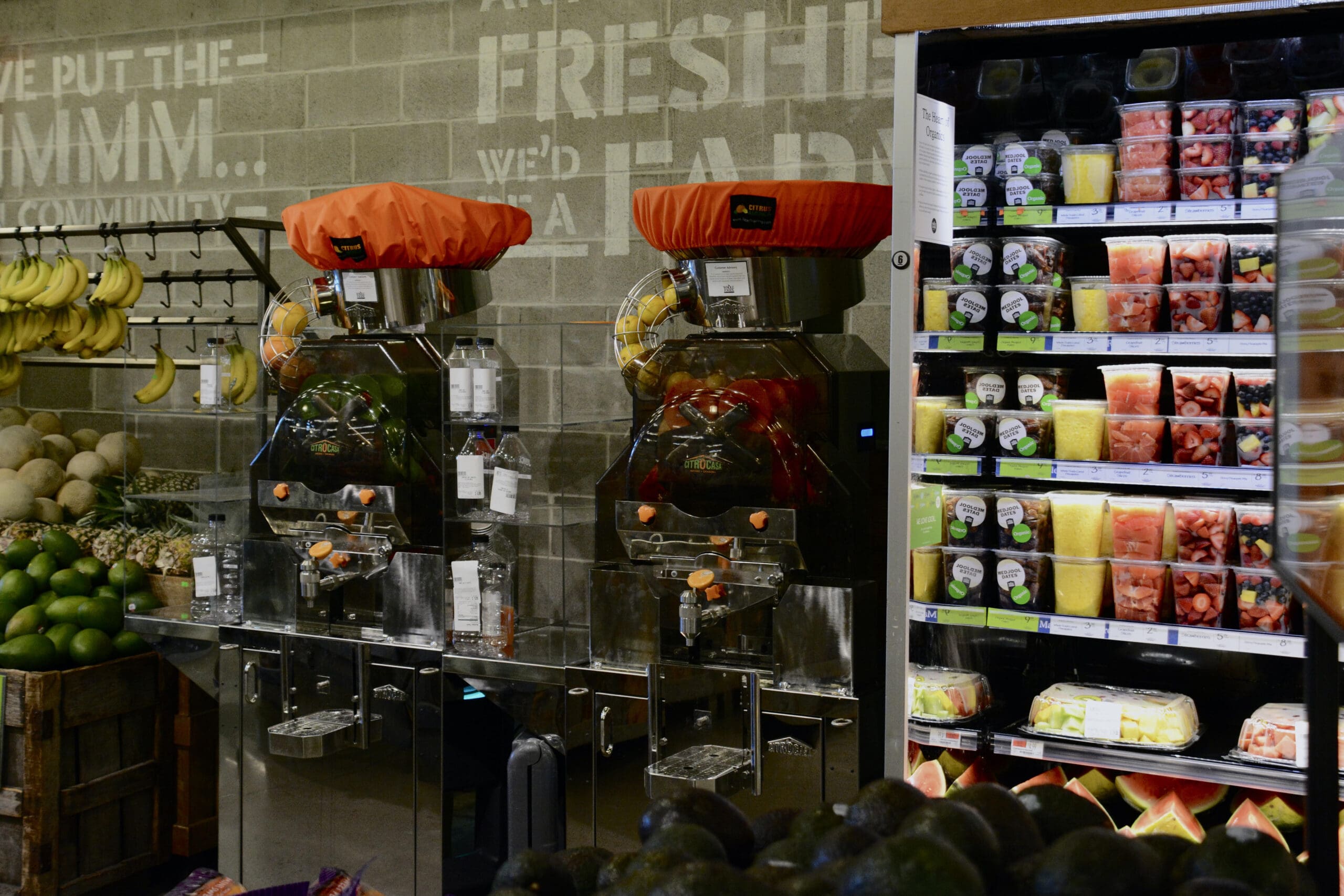How much should you pay for the best commercial juicer cost to meet your needs?
This is a very simple question that, at first glance, can be answered very simply or with some additional insight and perspective.
The simple answer is: A commercial juicer costs anywhere between $3.00 (yes, only $3) and upwards of $30,000.00. A commercial juicer will cost more than a residential juicer because it has to handle high volume, have more power, and be more durable.
The real answer is: It really depends on what you’re trying to achieve, what you’re juicing, how much you’re juicing, why you’re juicing, where you’re juicing, and how you’re serving your fresh juice. There are many factors that will be important to you that you’ll want to consider to help you answer this question.
The real question is how much does the best commercial juicer cost that best meets your commercial needs?
You need to understand what the total purchase price is, including shipping. You’ll want to understand the warranty, parts availability, motor size, and stainless steel content, just to name a few factors. The best commercial juicers have to be built well so they don’t break and are available to juice at any hour.
It doesn’t matter if you’re running a busy juice bar or a chain of juice bars; a school cafeteria or a cocktail bar; a high-end café serving the freshest ground coffee or a chain of restaurants serving fresh juice, when your business needs fresh product you want the best machine to help you deliver results.
When you operate a company, there are a lot of details you need to handle. Fixing a problem can be a huge distraction and be expensive, so if you’re going to purchase a commercial juicer, you’ll want to get the best commercial juicer for the right price to reliably meet your needs.
BUYING A JUICER IS SIMILAR TO BUYING A CAR
Before we dive into the juicy details, let’s talk about cars. Most people understand cars and there are some interesting parallels. Here are some considerations when buying a car:
- What kind of vehicle do you want? A car? A truck? An SUV, or something else? If a car, are you looking for a 5-door hatchback, a 4-door sedan, or a 2-door sports car?
- Do you want a daily commuter, a long-distance family hauler, a weekend head turner? Will you rely on this car on a daily basis or will it be an extra weekend ride? Other specifics?
- Are you looking for the most modern and safest car possible? Or are you interested in a beautiful old classic car that has barely any of today’s safety features?
- Are you looking for high performance, great gas mileage, long range, the latest hybrid or EV technology? Or are you looking for a car that can do it all?
- Do you want to buy a new car, covered under a full warranty? Or are you looking for an old classic that needs a little extra TLC on the weekends?
Once you’ve answered this short list of questions and considered what you’re looking for, in terms of aesthetics, image, brand, etc. you’re then prepared to set a budget and go shopping. Most people will come out with a range between $5,000-$50,000 for their desired vehicle. Some people will value, and be able to afford, a $100,000 vehicle, or even spend $500,000 for the ultimate in performance, luxury, or simply a rare old classic beauty to admire and take to car shows.
Anyone who has bought a car, knows that quality is not free. How are the cars built? Are parts available? What is the motor like? Is the car quiet? What are the most important features you are looking for? How are warranty issues handled? What is the ideal car for your daily driving? Does the car fit your image?
After you’ve considered all the above, you’ll also need to consider the car dealership or mechanics available in your area. It’s been my own personal experience that I bought a car from a dealership and salesperson that I really liked and the car fit all the criteria I had. Unfortunately, the dealership provided a series of truly awful service experiences. These were some of the worst service experiences I’ve ever encountered: not just technically, but the low-integrity service managers they had running their service department were downright insulting. I didn’t take it personally as I joked with some friends, “They’re equal opportunity losers - they treat everyone like dirt.” I sold that car off and moved on.
Here’s an important note – I didn’t stop driving, but I did move on to another vehicle, another brand, and an entirely different ownership experience.
COMMERCIAL JUICING EQUIPMENT
Similar to buying a vehicle, here is a quick introductory list of questions that you’ll need to answer before defining what kind of juicer you’re looking for and how much you’ll need to spend. Initial questions to consider:
- Are you looking for a home juicer? A juicer for a small commercial operation? Or a larger, busier commercial application? If a business, what type of business? Grocery store? Hotel? Restaurant? Café? Juice bar? Catering operations? Health club? Educational environment? Travel hub with grab & go options?
- Are you pressing citrus juice, for example, oranges, lemons, limes? Are you thinking about extracting juice from fruits and vegetables?
- Are you planning on juicing ‘on-demand’ or will you prepare larger batches of juice?
- Where are you planning on using your juicer? Will you juice where the customer, the consumer, can see you juice? Or in a back kitchen? Or in an off-site commissary?
- Finally, will you need technical and training support for your juicing endeavors?
AN OVERVIEW OF JUICING EQUIPMENT
Here is a very brief overview of different types of juicing equipment. We’ll provide a brief overview of centrifugal juicers, masticating juicers, cold press juicers, and citrus juicers. Each has its own special areas where they excel at extracting juice from the fruit and vegetables you’re wanting to juice.
MASTICATING (SINGLE- OR TWIN-SCREW) JUICERS: Without getting too complicated, masticating and triturating juicers use special augers, or screws, to shred up the produce to be juiced then push it through a specially designed screen to separate the juice from the solids. For the purpose of this article we have grouped them together but there is a broad range of technologies available driven by single- or double screw, use of plastic vs. metal, screen types and materials, etc. This broad range of juicers lead to some units being highly effective while others are only good for the most basic residential applications. Their yields tend to be higher than centrifugal juicers and these units are better at pressing leafy greens. There is also less oxidation than with centrifugal juicers so juices may last longer. This type of juicer may also be called a slow juicer because they can be slow on the production side but are quieter than centrifugal and have many advantages. This may be the best commercial juicer for juice bars without high volume demand but who still want all the juice they can get at a lower price. Cost: $200-$4,000
COLD PRESSES: Historically speaking, the cold pressing of juices is the oldest, most basic technology available. You can easily squish grapes with your fingers, step on them with your feet, or with larger manually driven screw presses designed to exert enormous pressure on the object to be pressed. Technology has advanced quite a bit of the past few thousand years and there are some great options out there for small cold presses and for large commercial cold press juicers. Today’s cold press relies on a two-step process, first shredding, or grinding up, the produce to be juiced and then squeezing it between two surfaces using hydraulics or other mechanical methods to exert force and extract juice. Most juicers in this segment require the use of special filter bags, which you need to clean and/or replace regularly, which are made of special material to let juice pass while retaining the pulpy fibers. These juicers tend to have high juice yields and produce a quality juice but they are not always easy to use or easy to clean. Due to their high costs, these juicers tend to be strictly for commercial use but there are some models in the $2,000 range some people may buy for home use and this juicer class can cost well over $25,000.
CENTRIFUGAL JUICERS: Simply put, centrifugal juicers spin at a high speed (2,000-15,000 rpms) and shred up the produce, fruits or vegetables, you want to juice, slam it against a fine mesh screen and separate the liquid from the fiber, or pulp. They are excellent for extracting juice from slightly harder products, such as apples, carrots, and ginger and are very good for juice-by-the-glass applications. They are not good at juicing citrus or leafy greens for various reasons, nor are they very good for anything requiring a shelf life of more than a few hours, due to higher separation and juice oxidation rates. These electric juicers usually have a compact design but are not ideal for quiet locations. A big price driver will be the amount of stainless steel used in their construction and the quality of the motor. Cost: $200-$4,000.
CITRUS JUICING
We’re Citrus America, so, naturally, we’re going to have a lot of insight into squeezing citrus juice, in addition to our general juicing knowledge.
When life give you lemons, make lemonade. There’s more than one way to juice an orange… so let’s talk about some different options below.
CLICK HERE IF YOU’D LIKE TO LEARN MORE ABOUT JUICING LIMES AND LEMONS FOR YOUR RESTAURANT.
MANUAL CITRUS JUICERS
If you’re squeezing at home and only press a few fruit at a time, you might consider a completely manual juicing solution. Personally, I have a few options in my own kitchen that I grab for depending on what I’m doing.
Citrus Hand Reamer: If I’m just juicing a lemon or lime for marinating fish or sprucing up a cocktail, I may reach for a little citrus reamer. It’s fast, easy, and nearly indestructible. It has good juice yield, but can be a bit messy. These tools are not so labor efficient but very fast to clean up, so, an excellent choice for 1-2 fruit. You’ll pay somewhere between $3 for a basic wooden one to $40 for a designer, hand-crafted ceramic one that looks nice in the kitchen.
Manual Reamer with Sieve and Bowl: If I’m going to juice a few lemons or limes for more cooking or a few cocktails, then I’ll probably grab for this juicer. It’s a bit faster and more efficient than the Hand Reamer, and a lot cleaner to capture the juice and filter out the seeds. There is a sieve and a bowl, so it requires a bit more clean-up compared to the Hand Reamer, but it pays off in other ways. You’ll probably spend in the $5 to $20 range here for different juicing options made of plastic or stainless steel.
Citrus Hand Press: I know this sounds crazy, but I love my little hand-squeeze citrus press, also known as a Mexican press. When it’s time to shake up a few Cosmopolitans or Margaritas on the weekend with a few friends coming over, I grab for this crazy little tool. It’s relatively fast and efficient, gets out most of the juice without over-juicing the peel, takes up very little space, good for smaller fruit, and cleans up quickly. That said, it’s great for juicing 5-10 or even 20 fruit, but I’d never want to have to juice a 40 lb box of limes using this. I’ve got better things to do with my time, as do your restaurant staff, truth be told. But for limited juicing, quickly adding some key ingredients, home use, etc. a hand press is an excellent option. A good quality one will cost between $10 and $30.
Geared Manual Citrus Press: When it’s the weekend and I’m juicing a small batch of oranges or grapefruit for breakfast with the family, I grab for the Italian geared citrus press I’ve owned for nearly 20 years. When all is said and done, I can whip up a few glasses of juice for the family and clean up the small mess in about 10 minutes. This is great if juicing 5-10 fruit. For any of the readers out there who remember their grandmother making them fresh orange juice, it was probably on some version of this classic technology. This juicer takes up limited counter space, is great for small batches of juice, and is relatively easy to clean up. You’ll probably spend between $50 and $300 for these juicers, but I’ve seen really nice ones up over $500.
Semi-Automatic Citrus Extractor: Well, I’m gonna shoot straight on this one. I’m not a fan of this type of juicer. You still have to manually cut the fruit you’re going to squeeze, you still have to juice it with manual pressure, you still have to remove the peels, you can only juice one-half at a time, and, finally, you still have a piece of equipment you’ll have to clean up in addition to the knife, cutting board, and juicing area. The difference here, is that there is a motorized, spinning reamer that’s designed to get more juice out of the fruit. Well, that means if you press aggressively, you’ll have higher yield, but you’ll likely find yourself with more peel oil and bitterness in your juice, which is where you don’t really want it. Personally, I don’t see any labor savings with manually cutting, manually pressing, manually removing peels, and then the required cleaning. In addition, a quality semi-automatic motorized juice extractor will cost you hundreds of dollars and will take up counter space. They range in price from about $50, for plastic residential units, up to $1,000 for heavier duty commercial varieties.
There are two speeds for all the non-automatic citrus juicers described above: slow and slower. These speeds are OK for residential use or very low volume commercial juicing. Juicing high volumes of citrus fruits requires the best commercial solution.
Anyone looking to juice high volumes of citrus fruits would be well advised to look at the best commercial juicers available for the job. These juicers should be easy to operate, easy to clean, and handle different size fruit. Additionally, these juicers should produce a delicious juice, a nutritious juice, a pure juice, a high quality juice: a juice that impresses the customer and keeps them coming back from more.
FULLY AUTOMATIC CITRUS JUICERS
Citrus juicing is a pretty simple process. Any citrus juicer acts like a cold press, but there additional functions that need to be performed. So, once you start juicing more volume, you’re going to need a real solution that you can count on every day. This juicer will need to be highly reliable and be able to deliver on Taste, Hygiene, and Efficiency.
Once you know you’re going to be juicing a full 40 lb. box of fruit per juicing session or per day, or like many of our customers, who are juicing at least 1-2 boxes per day, with medium customers juicing 5-10 boxes and larger customers juicing 10-20 boxes per day, we highly recommend a fully automatic citrus juicer. We have options with highly attractive ROIs for many different applications and volumes.
It’s hard to believe, but we have some large juicing operations and grocery store customers who easily juice a full pallet, that’s 56 boxes of fruit, nearly every day. When they say they make a ton of juice… they mean it, literally! One pallet of oranges, at 40 lbs per box, is more than 2,200 pounds of fruit. These customers easily juice more than 1,000,000 fruit per year.
We also have, for example, Mexican restaurant customers who juice between 5-15 boxes of limes per day for both their bar (think Margaritas) and kitchen (think salsa and guacamole) applications for the freshest, best tasting products.
A fully automatic citrus juicer cuts and squeezes the oranges, or other citrus fruit, in an integrated 2-step process. It also has an integrated peel removal solution, which then guides the juiced peels into either a peel chute or a peel bucket, depending on the choices you make.
Our line of commercial automatic citrus juicers, Citrocasa, offers a range of options regarding fruit feeding, electrical vs. hand-crank, serving options, fruit sizes, and range of other features with plenty choices in between. Commercial automatic juicing options range from in the $3,000s up to $15,000, if you include the additional value-added options and peripherals to support your merchandising and increase efficiency.
It’s important to remember: You don’t just buy an automatic juicer, you have to operate it every day, so quality matters. These juicers should be easy to clean, even be dishwasher safe, while producing the highest quality juice possible. Regardless of your size or application, we have the right option for your commercial juicing operation. These options will support attractive ROIs, so you know your investment make a lot of sense.
CLICK HERE FOR PAY BACK INTRODUCTION
Citrocasa Eco – This is an awesome juicer if you’re juicing at least a box per day, or session, and can easily support operations juicing more. Plus, the huge benefit of this juicer is there is no electricity required… it’s hand-cranked. You can use this on a food truck, juice at art fairs and farmer’s markets, or, if you want to think “fancy”, you can juice table-side Mimosas or simple fresh orange juice served to your guest. If you run a country club, wheel the Citrocasa Eco out to the first hole to juice up your memberships’ game. There’s no electrical plug to worry about and you’re free to roam. This juicer starts at $3,490 and has all of the amazing stainless steel, robust engineering and other amazing design features we’ve come to know and love about Citrocasa juicers but without the plug. Cut the cable and start juicing!
Citrocasa Fantastic Series – This aesthetically appealing juicer series is where big volumes can start… with the small footprint only 11” wide, it can completely transform your business and at 30 fruit per minute can juice for all but the largest and busiest operations. The Fantastic M/AS is an amazing choice for cafés, bakeries, juice bars, cocktail bars, Mexican restaurants, and even for small production facilities requiring volumes of citrus juice… think about popsicles, Italian ices, ice cream as well as facilities making fresh guacamole, salsa, marinades and salad dressings. The Fantastic F/SB-ATS has an amazing automatic hopper and offers excellent options for self-service locations in grocery stores and hotels. The Fantastic M/AS starts at $5,490 and has plenty of options to juice up your operations. The Fantastic F/SB-ATS starts at $8,590 depending on the options you choose. When you need to really start juicing, start juicing right. Let the volume begin.
Citrocasa 8000 Series – When you’ve got a lot of citrus fruits to juice, require more flexibility on fruit sizing, and are looking for a large billboard for freshness in your location, then the 8000 Series has a lot of options to offer. This is a fully automatic juicer. At 40 fruit per minute, you can squeeze out a box of 100-count oranges in 2.5 minutes, yielding more than 2 gallons of juice… this is the ultimate in on-demand juicing efficiency. In addition to all the food service and hotel options, this is the king of in-store grocery juicer options. This juicer can also master many juicing applications across full service hotels, catered operations, and a range of other operations. Options start at $8,890. When you’re serious about volume juicing then get serious with our highest ROI juicer, the 8000 Series.
All Citrocasa juicers are NSF listed and are also certified to meet OSHA standards, in line with UL-763 (Motor-Operated Commercial Food Preparing Machines). In addition to strict US test standards, all Citrocasa juicer machines have passed numerous EU standards related to hygiene and safety. Additionally, with the exception of the clear front cover, all Citrocasa juicer parts are dishwasher safe and can withstand high heat for added efficiency and hygiene.
SUMMARY ABOUT COMMERCIAL JUICER COST
The price for a commercial juicer ranges from $3 to over $30,000. Quality is not free, so expect to pay a fair price for quality in order to get the best commercial juicer to meet your needs.
- There are many options for juicing different types of fruit & vegetables: some are hand tools, while others are motorized machines
- Buying a juicer is, in some ways, like considering buying a car and having to decide if you want a sports car, a sedan, an SUV, a van, a 4x4 truck, etc.
- Know why you’re juicing and what you’d like to achieve, this will help you select the right juicing solution for your business or personal use. You’ll need to decide on the type of juicing you’re going to do, then select the type of juicer or extractor: masticating, slow juicer, cold press, centrifugal, or automatic citrus juicers, just to name a few.
- Consider the quality and support you will need to support your business. This includes stock availability, warranty support, shipping, e-mail and telephone support strategies.
- Understand the economics of juicing so you make the right investment and ownership decisions and keep in mind that for commercial operations, you’re making an investment into an operating piece of equipment for your business to use on a daily basis. Buy the best commercial juicer for your needs.
- Your options range from $3 up to $30,000, but it really depends on what you’re trying to achieve.
Regardless of what you’re trying to achieve, in the end it’s a matter of Taste, Hygiene, and Efficiency for the given task you’re trying to accomplish so buy your top choice and enjoy the benefits of a fresh juice program. A successful juicing program requires some thought and consideration which we help our customers address every day.
Contact us to discuss your juicing program today.
About Citrus America – Citrus America has been driving innovation and quality in the juicing segment for more than a decade in North America and the Caribbean. We’re the exclusive master distributor for Citrocasa and have driven many innovations and quality improvements in juicing equipment. In addition to equipment solutions, we provide tailored training and support strategies to help our customers earn Healthy Profits.
About Citrocasa – Citrocasa has been the pioneer in producing the most innovative and highest quality food grade stainless steel commercial citrus juicing equipment to the grocery, hotel and restaurant industries since 2005 across Europe. The Citrocasa 8000 Series was launched in 2005, with the 8000XB and the 8000SB. The 8000SB-ATS was launched in 2013. The Citrocasa Fantastic Series was launched in 2010 with the Fantastic M/AS. The Fantastic F/SB followed in 2011. Citrus America launched Citrocasa in the USA and North America in 2011.







